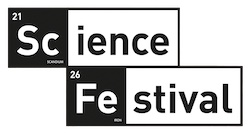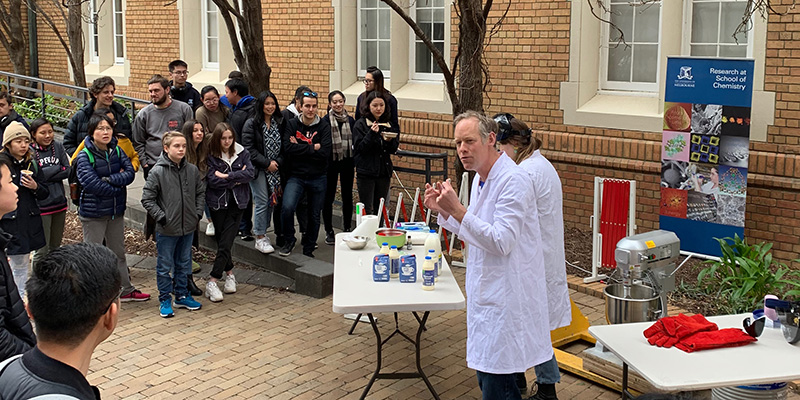Science Festival 2024
Discover, survive and thrive
12-16 August 2024

The University’s 10th annual Science Festival, held 12-16 August, was a week-long celebration of scientific knowledge, innovation and progress with a series of free events for students, staff and the general public.
From public lectures, expert-led masterclasses, panel discussions, games, and activities, this year's festival had something for everyone. The theme “Discover, survive and thrive” highlighted the importance of science discovery and innovation in ensuring the survival and thriving of different species in an ever-changing world.
This year's highlights
-
Action-packed expo showcases STEMM collaboration and innovation
The ‘Collaborate to Innovate’ Expo was held at Science Gallery Melbourne on 15 August – during National Science Week – and attended by around 400 people, including several school groups.
-
Model citizens: how mathematicians are helping the planet
Have you ever wondered about the practical applications of advanced mathematics? Some of the University of Melbourne’s leading academics have dedicated their careers to high level mathematics, taking a multidisciplinary approach and actively collaborating with industry partners, which allows them to apply these complex concepts to some of our times’ most pressing challenges.
-
Mid-afternoon Masterclasses 2024
Our popular Mid-Afternoon Masterclasses are a series of 45-minute lectures that showcase University of Melbourne scientists and their research. Each year throughout Science Festival, the Masterclasses are hosted online daily, and include engaging presentations, interactive Q&A, live demonstrations and lots of fun!
Is your school group interested in attending the 2025 Science Festival? Email science-events@unimelb.edu.au to be the first to find out what's on offer.
Missed out on previous years' events?
Or just want to relive the excitement? Watch older Science Festival recordings here in your own time.
-
Panel event: Science gets real – from problem to lab innovation to real-world impact (2023)
A group of scientists whose innovations are solving real-world problems discussed lessons learned that could help others. Recording now available.
-
Panel event: Should we care about science denialism? (2023)
How concerned should we be about the unscientific opinions of influencers? A diverse panel of experts discussed science denialism. Recording now available.
-
Mid-afternoon Masterclasses (2023)
This year's popular online Masterclasses explored El Niño, diamonds in volcanoes, patterns in AI, how to keep your furry friends happy, and the art of food science. Recordings now available.
-
Collaborate to Innovate Expo (2023)
The Expo featured a series of interactive installations that showcased the latest in STEM research across the University of Melbourne's faculties, schools, institutes and centres.

About Science Festival
Since 2015, the University of Melbourne has celebrated National Science Week with an annual, week-long Science Festival, showcasing the latest in STEM research across our faculties, schools, institutes and centres through free public events.
Questions?
Faculty of Science Events Team
science-events@unimelb.edu.au
Acknowledgement of Country
The University of Melbourne acknowledges the Traditional Owners of the unceded land on which we work, learn, and live: the Wurundjeri Woi-wurrung and Bunurong peoples (Burnley, Fishermans Bend, Parkville, Southbank and Werribee campuses), the Yorta Yorta Nation (Dookie and Shepparton campuses), and the Dja Dja Wurrung people (Creswick campus).
Indigenous Australians have been custodians of the lands and waterways of this country for thousands of years. As Australia’s first scientists, Aboriginal and Torres Strait Islander peoples have deep and enduring knowledge of the land, waters, and skies. We pay respect to Elders past, present, and future, and acknowledge the importance of Indigenous knowledge in the Academy. As a community of researchers, teachers, professional staff, and students we are privileged to work and learn every day with Indigenous colleagues and partners.